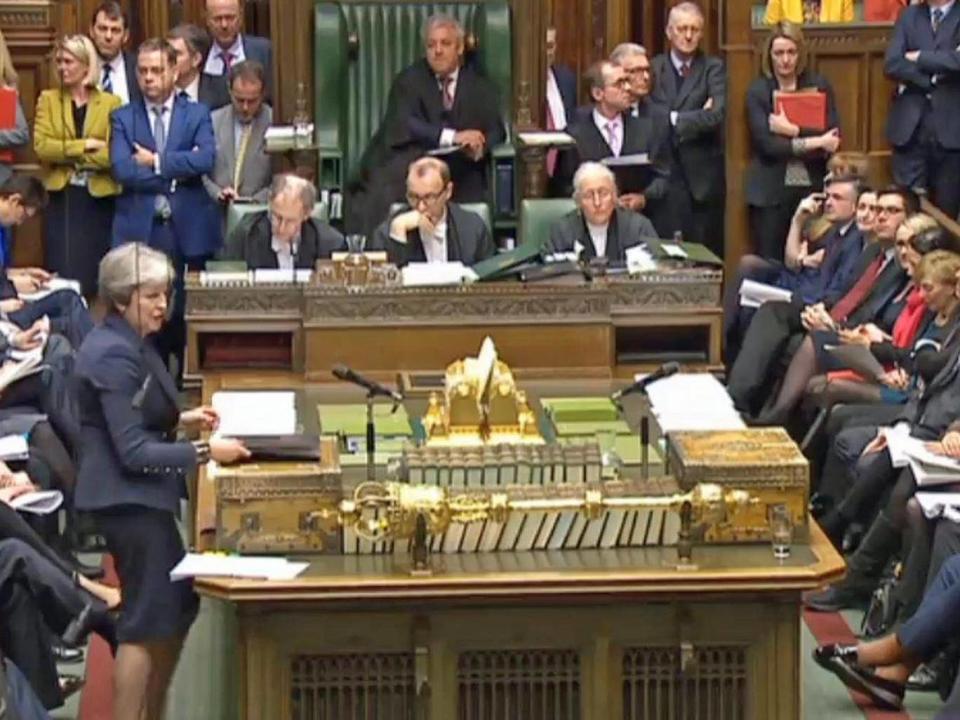There has been a culture of bullying in Parliament for decades – and change isn't coming quickly enough

In 2001, the Commons Speaker, Michael Martin, summoned me to his ornate office and threatened to throw The Independent’s entire political team out of Parliament. He was livid about our then Sketch Writer, Simon Carr, who was no fan of Mr Martin and had just described his face as “red and throbbing like a haemorrhoid” during a fiery intervention in the Commons.
The Speaker’s officials shuffled uneasily in their seats as he warned that our team would lose our parliamentary access passes unless Mr Carr toned down his attacks. I didn’t want a public war with the parliamentary authorities and promised to have a word. As I left, the body language of his clerks told me the Speaker was letting off steam and that the matter would blow over. I did nothing, and it did.
I didn’t regard the incident as bullying at the time, just part of the rough and tumble of politics. But it came back to mind as MPs faced new allegations of ill-treating staff employed directly by the House rather than by individual MPs. Known as “the clerks”, they play a vital behind the scenes role, advising the Speaker and Commons committees and generally oiling Parliament’s wheels.
Staff claim that the bullying culture at Westminster goes right to the top. The current Speaker, John Bercow, is among those facing accusations, which he strenuously denies. Frankly, the latest scandal was just waiting to happen: a natural sequel to the sexual harassment controversy which spread like wildfire to Parliament after the Hollywood producer Harvey Weinstein was exposed last autumn. Even at the time, some staffers said bullying was “the real story”, and much more prevalent than sexual harassment. Of course, some incidents can include both.
I have worked as a journalist in Parliament for 36 years, the past 20 for The Independent. I don’t think the culture has changed much during that time. While the public is less deferential towards their MPs – largely as a result of the 2009 scandal over their expenses – staff working in Parliament are not.
“Many MPs want to be treated like God, and so they are,” one woman staffer who has worked at Westminster for 40 years told me. “It hasn’t changed. They know that jobs in Parliament are very sought after; if they lose staff they can fill the jobs instantly. So, for the most part, the staff just put up with it.”
Common complaints include shouting at staff about the quality of their work – sometimes in phone calls to their home in the evening after they have already worked a 12-hour day. Those who protest risk further bullying.
It is not easy to switch jobs and remain in Parliament: MPs informally swap notes when someone applies for a job with a fellow member. So no staffer wants to be branded a trouble-maker.
Although some male officials have been verbally abused and some women MPs have been accused of bullying, many staff believe that misogyny is a factor in the phenomenon. One claimed that 95 per cent of the victims are women. Some MPs are notorious for their high turnover of staff; employees can’t stand it and leave, often to work elsewhere.
Staff accept that only a minority of MPs consistently behave badly; but they believe it is a sizeable minority which, as in the expenses scandal, gives the majority a bad name. Even honourable members have turned a blind eye to dishonourable behaviour by others. They have also perpetuated a system where MPs remain largely judge and jury about their own conduct.
Parliament is an unusual place to work. Bad practices long banished in most workplaces are tolerated. The fundamental problem arises from the fact that MPs are elected; as such, the system is loaded against staff. On the rare occasions when formal complaints are made about MPs by a clerk, the outcome is often that the clerk is moved to another role. The victim is punished, according to the trade unions representing staff, while the accused MP gets off scot-free.
Even when they are accused of behaviour that might have resulted in a formal warning or dismissal in another workplace, an MP might merely have to take part in a mediation process or write a private letter of apology to the staff member. The lack of confidence among staff in the Respect policy introduced in 2011 was shown by the fact that it has not been used to raise a single complaint of sexual harassment. No one believes that no such incidents have happened.
Jo Swinson, deputy leader of the Liberal Democrats, said: “There is a culture of exceptionalism in which many MPs see themselves as above other members of staff rather than being in a collegiate environment where we work with clerks and members of staff who want to deliver good law-making for the sake of democracy.

“It’s so important to change that culture. Even if you have a process, if the MPs have all the power and it is easier to move somebody more junior than to challenge somebody in power, then nothing will change.”
Another problem is the tradition that alleged misbehaviour by MPs is best handled by party whips. They have an interest both in preventing revelations that would embarrass their own party, and in keeping damaging information about an MP in their back pocket – to be deployed if the MP is threatening to rebel in a Commons vote.
You can’t keep politics out of Westminster.
Yet in the #MeToo era things appear finally to be changing. Staff have a WhatsApp group to warn each other about MPs who behave badly. When Sir Michael Fallon resigned as Defence Secretary last November, the first casualty of the sexual harassment controversy, he said: “The culture has changed over the years and what might have been acceptable 10 or 15 years ago is clearly not acceptable now.”
The revelations of sexual harassment have emboldened more staff to speak out about bullying. Last week, BBC2’s Newsnight programme spoke to several clerks who claimed to be victims of bullying. Some of the allegations date back several years and have been reported in newspapers. But the decision by some complainants to speak out has put the behaviour of MPs firmly back in the spotlight.
The programme reported that Kate Emms, Mr Bercow’s former private secretary, suffered post-traumatic stress disorder after working for him, quoting witnesses who claimed he undermined and shouted at her. The Speaker’s spokesperson insisted he “completely and utterly refutes the allegation that he behaved in such a manner, either eight years ago, or at any other time”. Mr Bercow has supported a “zero tolerance” of bullying and harassment in Parliament.
Newsnight also reported claims that Tory MP Mark Pritchard shouted at clerks and told some their careers were over. Mr Pritchard, MP for The Wrekin, said: “I understand, over the past several years the House authorities have addressed numerous complaints about MPs, but they have also informed me they have no record of any complaints against me, and if they had, I would have been notified.”

The programme further alleged that Labour MP Paul Farrelly made life impossible for Emily Commander, a highly respected committee clerk who suffered health problems and has now emigrated.
This case raises serious questions about Commons procedures. It was referred to the House of Commons Commission, a group dominated by MPs and chaired by the Speaker, which said alleged incidents before the Respect policy’s introduction could not be considered.
The commission could not rule on Ms Commander’s complaint and voted instead to suspend the Respect policy because “investigations were undertaken by a House of Commons official, who might be considered to have an interest; and members had no right of appeal if a complaint was upheld.”
Andrew Kennon, a senior clerk who took up Ms Commander’s case, appears to have paid a price. Other clerks believe Mr Kennon in effect ended his own career by standing up to MPs. He is now retired.

Mr Farrelly, MP for Newcastle-under-Lyme, told the Commons on Monday that Respect was scrapped because it was not fit for purpose. He said the Newsnight report was “very one-sided, selective,” adding: “I was flayed by selective leaking six years ago, and it has happened again now.”
Initially, the House authorities dismissed the programme’s claims of a “culture of fear” as “a grotesque exaggeration”. This provoked a backlash from clerks. David Natzler, the Clerk of the House, admitted in a letter to staff that there was “dismay” at the initial response, saying: “I acknowledge we got it wrong in giving the impression we were in denial.” He insisted the revised Respect policy introduced in 2014 improved protection for staff, but acknowledged it needed further improvement.
Following the sexual harassment revelations, a new independent complaints and grievance policy for MPs’ staff will be introduced by this summer after all-party agreement. MPs elected at the next election will get training about acting as an employer, though it will not be compulsory for current MPs.
The new system was not initially due to cover officials employed directly by the House, like the clerks. That is now being reconsidered because of Newsnight’s disclosures.
Andrea Leadsom, the Leader of the Commons, will on Monday propose an independent inquiry following the revelations. But it will still report to the Commission, made up of six MPs, two Commons officials, two lay members and the Speaker. Mr Bercow will not chair Monday’s session because of the allegations against him.
It is unclear whether the proposed inquiry would investigate specific allegations or stick to generalities. Indeed, it is not certain the investigation will go ahead.
The latest revelations have become entangled with moves by a small number of Tory MPs to force Mr Bercow out of his job. Labour wants to keep him there and so may get cold feet about an inquiry, which it suspects is a device to undermine the Speaker. Again, you can’t take the politics out of it.
Some MPs, often those among the younger generation, believe the time has come for a wholly independent complaints system in which an outside body would have the power to sanction MPs, including suspending them from the House. But older MPs oppose that. One Tory grandee told me: “We are not having it. There is no way we will put up with another IPSA [The Independent Parliamentary Standards Authority set up after the expenses controversy].”
Not before time, the culture at Westminster is changing. But the wheels turn very slowly. It is time for the process to be fast-tracked, and for Parliament to become more like the real world it is supposed to represent.

 Yahoo News
Yahoo News 
